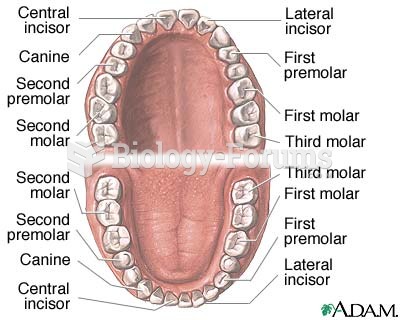|
|
|
The immune system needs 9.5 hours of sleep in total darkness to recharge completely.
The first oncogene was discovered in 1970 and was termed SRC (pronounced "SARK").
Hippocrates noted that blood separates into four differently colored liquids when removed from the body and examined: a pure red liquid mixed with white liquid material with a yellow-colored froth at the top and a black substance that settles underneath; he named these the four humors (for blood, phlegm, yellow bile, and black bile).
Nitroglycerin is used to alleviate various heart-related conditions, and it is also the chief component of dynamite (but mixed in a solid clay base to stabilize it).
About 100 new prescription or over-the-counter drugs come into the U.S. market every year.







